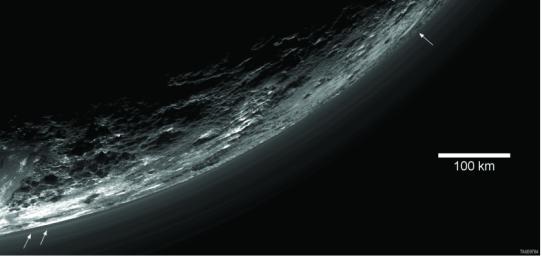
|
Pluto’s Haze
- Click the image above for a larger view
- Full-Res JPEG (2288 x 1081) (160.7 kB)
- Full-Res TIFF (2288 x 1081) (2.7 MB)
Caption:
This image of haze layers above Pluto's limb was taken by the Ralph/Multispectral Visible Imaging Camera (MVIC) on NASA's New Horizons spacecraft. About 20 haze layers are seen; the layers have been found to typically extend horizontally over hundreds of kilometers, but are not strictly parallel to the surface. For example, white arrows indicate a haze layer about three miles (five kilometers) above the surface on the left, which has descended to the surface at the right.
Background Info:
The Johns Hopkins University Applied Physics Laboratory in Laurel, Maryland, designed, built, and operates the New Horizons spacecraft, and manages the mission for NASA's Science Mission Directorate. The Southwest Research Institute, based in San Antonio, leads the science team, payload operations and encounter science planning. New Horizons is part of the New Frontiers Program managed by NASA's Marshall Space Flight Center in Huntsville, Alabama.
Cataloging Keywords:
| Name | Value | Additional Values |
|---|---|---|
| Target | Pluto | |
| System | Pluto | Kuiper Belt |
| Target Type | Dwarf Planet | KBO |
| Mission | New Horizons | |
| Instrument Host | New Horizons | |
| Host Type | Flyby Spacecraft | |
| Instrument | Multispectral Visible Imaging Camera (MVIC) | |
| Detector | ||
| Extra Keywords | Atmosphere, Color, Haze | |
| Acquisition Date | ||
| Release Date | 2016-03-17 | |
| Date in Caption | ||
| Image Credit | NASA/Johns Hopkins University Applied Physics Laboratory/Southwest Research Institute | |
| Source | photojournal.jpl.nasa.gov/catalog/PIA20536 | |
| Identifier | PIA20536 | |
